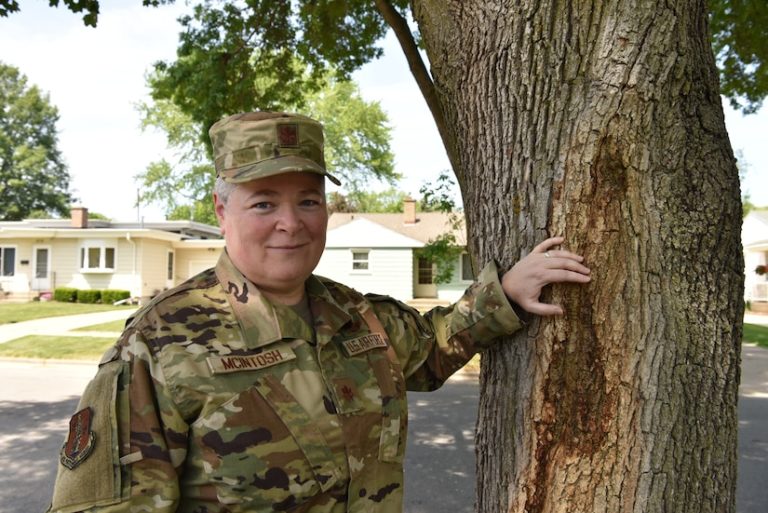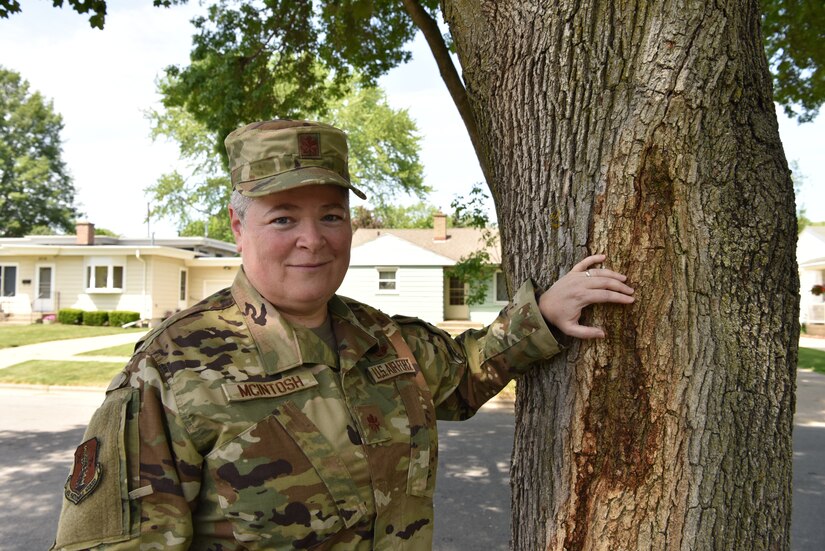

Milwaukee, Wisc. – The U.S. military is often seen as stable and unwavering – standing the test of time as society, politics, and attitudes change. This does not mean, however, that the Air Force is unwilling to grow with its members. Chaplain (Maj.) Kendra L. McIntosh knows this well.
One poignant example of the military’s growth is reflected in Chaplain McIntosh’s ability to now serve as an openly gay woman.
“I joined the Air force in 1988 because I wanted to serve my country and fly,” said McIntosh. “I was interested in space, and had a degree in aerospace engineering from University of Kansas. I commissioned as a 2nd lieutenant just one day after graduating college.”
During her active duty time in service, Chaplain McIntosh served as a senior navigator for the KC-135. Throughout her flying career, Chaplain McIntosh flew combat, combat-support, humanitarian airlift, test flight, medical-evacuation, and training sorties. She was assigned to six different bases, participated in eight deployments, and earned numerous awards and decorations. Though her career was meritorious and remarkable, McIntosh knew there was more in store for her.
“I knew it was time for me to wrap up my military career in combat and combat support around the time I earned my master’s degree,” said McIntosh. “In the six months following my active time in service, I found the path to ordination and began seminary school in the fall of 2000.”
Chaplain McIntosh was ordained an Episcopal Priest in 2004. She spent eight years in parish ministry in the city of New York prior to considering chaplaincy. Her career as a chaplain began with Clinical Pastoral Education at the Kansas City VA Medical Center.
While Chaplain McIntosh cherished her time in active service, there were aspects of her life she felt she was not able to fully explore until she had left the service.
In her late teens and twenties, McIntosh complied with expectations of her family and her midwestern roots. In her thirties, she was divorced and enjoying a successful career – and questioned her sexuality.
“I was not ‘out and open’ while serving, but also was not dating women while I was serving active duty,” said McIntosh. “I didn’t have the freedom to date or explore relationships with women while I was serving during that time.”
Homosexual discrimination in the United States military can be traced back as far as the end of the first World War with revisions that were added as part of The Articles of War of 1916. The following decades would yield more policies to deter same-sex relations, with homosexuality itself becoming explicitly criminalized in 1982. In 1993, the Don’t Ask, Don’t Tell policy was issued by the Clinton Administration and altered previous language to state that service members would not be asked about their sexual orientation, but would still be discharged for disclosing it.
“It was difficult enough in the 1990s, especially for competent women in the military,” said McIntosh. “I didn’t really explore my sexuality until leaving the service because of the scrutiny and non-acceptance.”
The time McIntosh spent after separating from active duty fulfilled her in many ways, but many people in her life encouraged her to consider rejoining. The Don’t Ask, Don’t Tell policy was a major deterrent for McIntosh, however, as she had now ‘come out’ as lesbian.
“The repeal of policy was a requirement of mine before getting back in uniform,” said McIntosh. “There is no way I would have gotten back in if I wouldn’t have been able to bring my whole self to this.”
The Don’t Ask Don’t Tell policy was finally repealed in 2011. In 2013, spousal and family benefits were extended to same-sex married partners, marking more strides towards equality for service members who identified as gay, lesbian, and bisexual.
McIntosh recognized this new change in policy, and decided to rejoin the service in 2012, this time as a chaplain for the Indiana Air National Guard. In 2016, Chaplain McIntosh joined the Wisconsin Air National Guard. During this time, McIntosh met her wife.
“When we started getting serious, I wasn’t sure how it (our relationship) would be accepted on base. What I found was a lot of support when I came on base after we got married,” said McIntosh. “Everyone was just thrilled and asked about the ceremony and my wife and when everyone was going to be able to meet her. They offered tons of congrats.”
Now, Chaplain McIntosh lives as a citizen Airman, working full-time as the Chief Chaplain at the St. Cloud VA Health Care System in Minnesota and serving as a traditional guardsman. She thinks her experience makes her a valuable resource to the Airmen around her.
“I think being an ‘out’ lesbian helps other gay or lesbian service members. I have been able to help members of my unit determine how their faith and their sexuality intersect,” said McIntosh. “I am able to bring my whole person to my chaplaincy and to my service, and that, in turn, expands the reach of who we can support as a chaplain corps, as a base, and a wing.”
Col. Adria Zuccaro, 128th Air Refueling Wing Commander, has made it a priority of hers to promote diversity with their ranks.
“My expectation is that Airmen should be able to come to work, do their job and be accepted as a teammate,” said Zuccaro. “It’s the mission that binds us. Our differences when accepted make us stronger.
The U.S. Department of Defense (DoD) recognizes June as Pride Month, celebrating the history of LGBTQ service members who have bravely served and sacrificed in the U.S. military.